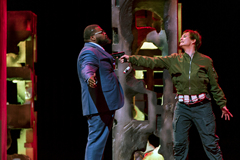| Opera Reviews | 25 April 2024 |
Inspiring Mozartby Craig A.P. Hamilton |
|
| Mozart: La Clemenza di Tito Dutch National Opera May 2018 |
|
|
Controversial director Peter Sellars once again challenges the status quo here, while his counterpart in the pit is the other enfant terrible Teodor Currentzis with the orchestra and chorus of MusicAeterna Novosibirsk, and the result is you get a revamped, reworked, cut and paste Mozart. Sellars overarching themes such as questioning stereotypes, racism, terror campaigns, deceptions, perceptions, greed and quest for power, oppression of the poor, exploitation, political intrigue, colonialism and forgiveness were all explored. Musically recitatives were extensively cut and then cherry picked excerpts from the C Minor Mass, the Requiem, the Maurerische Trauermusik, the Adagio and Fugue in C Minor KV 54 were added, which turned out to be surprisingly effective and emotive. Sellars stated the cutting of the recitatives is “the first step towards a true Mozart opera.” While this is questionable to say the least, Currentzis explains the additions were “with the greatest possible love towards the composer.” The sets by George Tsypin were minimalist, at best annoying and at worst a sterile, huge gaping empty space within which sound could easily evaporate or be absorbed. For me they resembled IKEA look-alike cupboards or even those found in many European bakeries from which a customer chooses rolls or cakes. More seriously though perhaps buildings, skyscrapers and pillars? Offering some relief the sets were lit by James F. Ingalls to perhaps depict emotion expressed in colour such as red for anger or danger, or more literally or realistically when they were changed or morphed into ruined, buildings after the attacks on the city. In the cast tenor Russell Thomas offered a warm and rounded tone as Tito, while Jeanine de Bique as Annio who despite a small angelic voice was still able to produce coloratura full of colour and flexibility, and Janai Brugger as Sevilla whose voice and sound was highly nuanced in its vulnerability and strong on other occasions. Willard White produced a booming, terrifying rich sound as Publio, while Paula Murrihy as Sesto and Ekaterina Scherbachenko as Vitellia completed the list. Currentzis offered an enthusiastic conducting style, using flicks of the head, jumps up and down, hands flowing or flapping like a swan, and other techniques to convey his meanings to the musicians and the audience alike. Rather than being distracting or self indulgent it was sizzling and inspiring. What was apparent throughout was the total symbiosis with his MusicAeterna orchestra and chorus whose contribution was crisp, precise, coloured and richly detailed. The ensemble work was second to none whether individually as showcased by the clarinettist and horn player who accompanied Vitellia and Sesto on stage at times, or when the full orchestra produced such vocal beauty that was heart stopping. This perhaps might have been old wine in a new skin, but it turned out to showcase how when great minds have a concept and all parties work together in a magical way we can be left with a musical experience all the more enriched and inspired by this unrelenting commitment to music.
|
|
| Text ©
Craig A.P. Hamilton Photo © Ruth Walz |

 This La Clemenza di Tito is a co-production of the Dutch National Opera, Deutsche Oper Berlin and the Salzburg Festival where it premiered in 2017 at the Felsenreitschule.
This La Clemenza di Tito is a co-production of the Dutch National Opera, Deutsche Oper Berlin and the Salzburg Festival where it premiered in 2017 at the Felsenreitschule.





